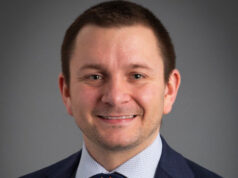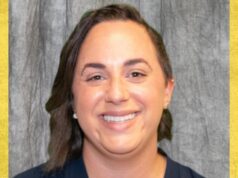
Dr Enrico Ascher, in his role as President of the Eastern Vascular Society (EVS), discussed the complexities and challenges facing the specialty. Within this Ascher anticipates that the EVS will adopt an even larger role – beyond the scientific environment. He also acknowledged that the EVS must develop strategies that can help members to fend off unfair competition and that issues including reimbursement, ethics and recognition of vascular surgery as a mature and independent specialty should be addressed, Ascher said, “These issues are crucial on both the national and regional levels. The world is changing and so must we. Complacency will only help those who are competing for our patients and will not thwart those who hinder the natural evolution of our continued success as vascular specialists.”
Ascher spoke of his concern regarding the very survival of the specialty and discussed how the Society must become proactive in the defense of livelihoods while maintaining acceptable codes of ethics. “Ever since the modern evolution of our specialty as vascular surgeons, interventionists, and clinicians, we have been under a constant assault that continues to threaten our existence. I truly believe that we must stand together as a whole and compete with those who would falsely usurp that which we have thus far achieved, as we continue to remain faithful to ethical principles,” said Ascher.
“Whether we like it or not, the practice of medicine today is as much a business as it is a science practiced with art. For obvious reasons, it cannot be professed as philanthropy or be based solely on the Good Samaritan spirit. Not to recognize this reality is naive and tantamount to professional failure, ” he continued. Ascher believes that it is now necessary to embrace a model of medical ethics that reflects today’s socioeconomic climate. He stated that a balance must be struck between the interpretation of ethics and politicians and administrators whose intent is to subjugate physicians to accept diminishing reimbursement. Therefore, there is a risk that a model more suited to the priesthood than to health care providers will be created.
Currently, the SVS is developing a code of ethics for its membership that is intended to serve as guidelines in medical, ethical, social and professional relationships in the practice of vascular surgery. This code represents the standards used to evaluate a member’s maintenance of good professional standing and to evaluate qualifications for membership by applicants. “Interestingly, the specialty of vascular surgery is one of few that have not yet published a comprehensive code of ethics. Hopefully, this will soon be accomplished by the Society for Vascular Surgery (SVS),” Ascher added.
There will be nine distinct areas of focus for addressing ethical issues of importance to every vascular surgeon: (1) vascular care provider; (2) health care providers; (3) patient and patient’s family; (4) legal profession; (5) government; (6) insurance, compensation, and reimbursement agencies; (7) industry; (8) patients and research; and (9) community and world affairs. For each of these distinct areas, there are guidelines for identifying issues and their paths of resolution. When these guidelines are finalized, Ascher proposed that they be adopted by the EVS as well as by the other regional and national vascular societies, allowing the Society to speak with one voice so there are no misunderstandings among vascular surgeons.
In the meanwhile, Ascher offered his lighthearted vision of a modern Ten Commandments for vascular surgeons that he believes can help the speciality to define its purpose in the 21st century: 1. Respect your patients. 2. Do your patients no harm. 3. Do not misrepresent your abilities. 4. Do not bear false witness against your colleague. 5. Do not covet your colleague’s practice. 6. Do not steal your colleague’s patients. 7. Honor your mentors. 8. Mentor your juniors. 9. Share your knowledge with your peers. 10. Advance the ideals of vascular surgery.
The Council (of the EVS) has voted to create an Ethics Committee to be chaired by Drs Keith D Calligaro and Clement Darling, III. This ethics committee will evaluate meritorious complaints by members of any unfair, unethical or unsafe practices by any institution or physician. An example of such a charge is a member who believes he or she has been affected by mail sent by other vascular specialists to their referring physicians claiming unsubstantiated superior results in their clinical practices. Ascher believes this overdue service from the society will go a long way to curb increasingly frequent abuses of “practice bashing.” All charges received by the Society will undergo review by the ethics committee. The defendant will then be afforded due process to address any allegation in writing. EVS members found to be not compliant with the Society’s published ethical standards may be either censored or suspended for a specified period of time. Additionally, the EVS will pursue an affiliation with the SVS to extend their expert witness testimony program to include cases referred by EVS members.
Ascher then moved on to discuss the future of vascular surgery. He said, “Even though we have developed the techniques and standards of care for peripheral vascular disease, we are now on the brink of losing our status as the leaders in the prevention and management of vascular diseases. Today, I wonder how we came to this situation and what we can do to maintain our prominence in the care of peripheral vascular disease.”
“Without a doubt we have been under a sustained assault by radiologists and cardiologists, and it is time to defend ourselves. On a daily basis, our patients hear advertisements on the radio, see portrayals in television shows, and read in newspapers and magazines of the association of cardiologists and interventional radiologists in the care of peripheral arterial disease. Rarely are vascular surgeons mentioned,” Ascher argued. Therefore, he claims patients’ confidence is undermined when they are seeing the mysterious and little known entity, the vascular surgeon, and everyone else is proudly under the care of a cardiologist for their carotid disease.
“Interventional cardiologists are taking advantage of our little known status to move forward, aiming to take the lead in endovascular techniques and portray us as surgeons who are resistant to natural evolution. There are many obvious reasons why we remain largely unknown. One of these is that we are not recognized as an independent specialty from general surgery. However, Ascher announced that the Councils of the EVS and the SVS, as well as the membership of the Association of Program Directors in Vascular Surgery have voted to support the continued efforts by the American Board of Vascular Surgery to achieve an American Board of Medical Specialties (ABMS), approved independent board status. In addition, the American Board of Surgery (ABS) has put forward an application to the ABMS for a Primary Certificate in Vascular Surgery; that is, vascular surgeons no longer need to pass general surgery boards before being certified in vascular surgery. This application received unanimous endorsement by the members of the ABS who recognized vascular surgery as a specialty and not subspecialty. Ascher believes this is a stepping stone to complete board independence in vascular surgery.”
Ascher then discussed the growth of the internet, how elderly patients are the fastest growing base of online health consumers and how vascular surgeons must vigorously publicize themselves to the public and health care providers as the premiere body of expertise in the management of peripheral vascular disease. Therefore, he called for the establishment of a blue-ribbon panel that will define common marketing goals and make recommendations as to how to effectively exploit these goals to their maximum potential. The American Vascular Association has created effective marketing campaigns that have significantly contributed to increased awareness of the role of vascular surgery in the prevention and treatment of vascular diseases. Ascher also called for the development of public awareness programs related to vascular diseases by medical societies, hospitals or individual physicians.
“These are difficult times for vascular surgeons trying to establish, maintain, and grow their practices. Various factors, including rising malpractice premiums, increasing staff salaries and benefits, and Federal regulations all seem to be at work against the business of medicine. Rather than getting discouraged, we should think about strategies to minimize this burden and maximize our productivity,” said Ascher.
“We can no longer depend on surgical cases to be our major source of revenue – we need to look for other sources of income. For example, in 2003, only 40% of the income for the Vascular Institute of New York was directly attributable to vascular operations and endovascular procedures.”
Ascher believes that the speciality needs to identify itself with patients, healthcare providers and those who will become the next generation of vascular surgeons. “We must rekindle an interest in our specialty. Also, we cannot sit idly and wait for cases to be referred to us. In the past, we reigned supreme in peripheral vascular care because no one else had the skills. That is simply no longer the case. The time is now to aggressively compete against interventional radiologists and cardiologists and to strive for our independence as a specialty. We are few, but we are strong and determined. We will overcome these and future challenges because we are a fair and hard-working group of surgeons,” he stated.
To conclude, Ascher quoted Will Rogers, an American political humorist, who once said, ‘Even if you’re on the right track, you’ll get run over if you just sit there.’ “I believe that we are on the right track, but let us not tarry in the advancement of our cause-let’s do it!”













